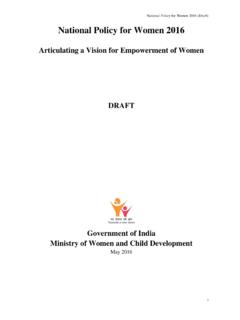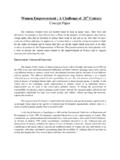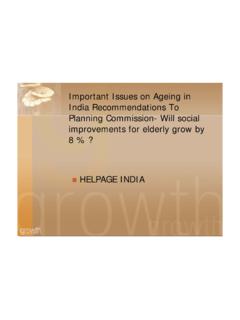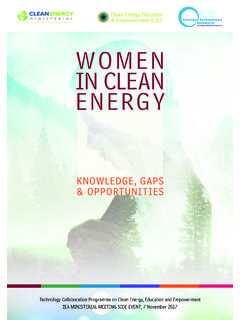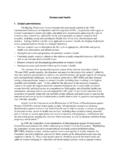Transcription of Women’s Economic Empowerment - OECD.org
1 April 2011 women s Economic Empowerment Issues paper DAC Network on Gender Equality (GENDERNET) 2 This paper was prepared by the DAC Network on Gender Equality (GENDERNET) ( ), as an input to the DAC Network on Poverty Reduction s Task Team on Empowerment . It has benefited from contributions from the members of the two Networks and from the OECD s Development Centre. In particular, the GENDERNET Secretariat wishes to thank both the Netherlands and Sweden for the many examples of innovative practices which they provided and Rosalind Eyben of the Institute of Development Studies, University of Sussex, for her advice. 3 women S Economic Empowerment Issues paper April 2011 KEY MESSAGES women s Economic Empowerment is a prerequisite for sustainable development, pro-poor growth and the achievement of all the MDGs. At the same time it is about rights and equitable societies.
2 There is scope for increasing donor investments in women s Economic Empowerment . Achieving women s Economic Empowerment is not a quick fix . It will take sound public policies, a holistic approach and long-term commitment from all development actors. Start with women by integrating gender-specific perspectives at the design stage of policy and programming. More equitable access to assets and services - land, water, technology, innovation and credit, banking and financial services - will strengthen women s rights, increase agricultural productivity, reduce hunger and promote Economic growth. Infrastructure programmes should be designed to maximise poor women s and men s access to the benefits of roads, transportation services, telecommunications, energy and water. women experience barriers in almost every aspect of work. Employment opportunities need to be improved.
3 At the same time women perform the bulk of unpaid care work. This is an area for greater attention by development actors through increased recognition and valuing of the ways in which care work supports thriving economies. Innovative approaches and partnerships are needed to scale up women s Economic Empowerment . We recognise that gender equality, the Empowerment of women , women s full enjoyment of all human rights and the eradication of poverty are essential to Economic and social development, including the achievement of all the Millennium Development Goals. (Keeping the promise: united to achieve the Millennium Development Goals (2010), para. 12). 4 TABLE OF CONTENTS 1 Why women s Economic Empowerment matters .. 6 2 Where is the donor money going? .. 8 3 Specific challenges .. 10 Rights vs. smart economics .. 10 Reaching the poorest of the poor and women in remote communities.
4 10 Is enough being done to support the farmer and her husband? .. 11 Picking winners is not the only way to support women entrepreneurs .. 11 Give women credit micro-finance is not a silver bullet .. 12 Taking a holistic approach to women s Economic Empowerment .. 13 Gender responsive public policies are necessary .. 14 4 Improving donor practice in key areas of the economy .. 17 Responding to country and regional contexts .. 18 Control of productive assets and access to services in the agricultural sector .. 18 Making markets work better for women .. 22 From micro-level to viable businesses .. 23 Designing infrastructure programmes to benefit poor women .. 24 The care economy .. 25 Improving employment for women .. 26 5 Working in partnership for women s Economic Empowerment .. 28 Using aid modalities, including dialogue .. 28 Improving co-ordination amongst donors to scale up successful approaches.
5 28 Working with allies, including the private sector .. 28 Supporting women s associations and collective action .. 29 ANNEX: AID TO women S Economic Empowerment BY DAC MEMBERS .. 31 5 Charts Chart 1. Gender equality and women 's Empowerment focus in Economic and productive sectors .. 9 Chart 2. Gender equality focus of sector allocable aid in the Economic and productive sectors .. 9 Chart 3. Mechanical equipment use by female- and male-headed households .. 20 Chart 4. Gender equality focus of sector allocable aid in agricultural sub-sectors .. 20 Boxes Box 1. Why women 's Economic Empowerment matters for pro-poor growth .. 7 Box 2. women -owned solutions in 12 Box 3. Tales of the unexpected from Bangladesh .. 13 Box 4. Young women around the world are at cross roads .. 14 Box 5. Integrating a gender perspective into the Moldovan budget process .. 15 Box 6. Empowerment multiplier effects through cash transfers.
6 16 Box 7. Identifying and mitigating risks for women in the design of programmes at the Inter-American Development Bank .. 17 Box 8. Three priority areas for agricultural reform .. 19 Box 9. Agriculture support programme, Zambia .. 21 Box 10. Improving extension services to women in Malawi .. 21 Box 11. Equality of land tenure in Rwanda .. 22 Box 12. Trade at hand - business opportunities through cell phones .. 23 Box 13. Sharing the credit risk in Ethiopia and Kenya .. 23 Box 14. The Rural Roads Project in Peru .. 24 Box 15. Key strategies for expanding women 's opportunities for full and productive paid employment .. 27 Box 16. A partnership to strengthen the Amhara Region women Entrepreneurs Association, Ethiopia .. 29 Box 17. An innovative approach to funding and implementation .. 29 Box 18. Empowering women in the informal economy .. 30 6 1 Why women s Economic Empowerment matters KEY MESSAGES women s Economic Empowerment is a prerequisite for sustainable development, pro-poor growth and the achievement of all the MDGs.
7 women 's Empowerment is about rights and equitable societies. Economic Empowerment is the capacity of women and men to participate in, contribute to and benefit from growth processes in ways which recognise the value of their contributions, respect their dignity and make it possible to negotiate a fairer distribution of the benefits of Economic Empowerment increases women s access to Economic resources and opportunities including jobs, financial services, property and other productive assets, skills development and market information. women s Economic participation and Empowerment are fundamental to strengthening women s rights and enabling women to have control over their lives and exert influence in It is about creating just and equitable societies. women often face discrimination and persistent gender inequalities, with some women experiencing multiple discrimination and exclusion because of factors such as ethnicity or caste.
8 women perform 66% of the world s work, and produce 50% of the food, yet earn only 10% of the income and own 1% of the property. Whether the issue is improving education in the developing world, or fighting global climate change, or addressing nearly any other challenge we face, empowering women is a critical part of the equation. Former President Bill Clinton addressing the annual meeting of the Clinton Global Initiative (September 2009) The Economic Empowerment of women is a prerequisite for sustainable development, pro-poor growth and the achievement of all the Millennium Development Goals (MDGs). Gender equality and empowered women are catalysts for multiplying development efforts. Investments in gender equality yield the highest returns of all development women usually invest a higher proportion of their earnings in their families and communities than men.
9 A study in Brazil showed that the likelihood of a child s survival increased by 20% when the mother controlled household 1. Eyben, R and others (2008), Conceptualising Empowerment and the implications for pro-poor growth, Institute of Development Studies at the University of Sussex, Brighton. 2. Sweden, Ministry for Foreign Affairs (2010), On equal footing: policy for gender equality and the rights and role of women in Sweden s international development cooperation 2010 2015, MfA, Stockholm. 3. OECD (2010), Accelerating progress towards the MDGs through pro-poor growth: policy messages from the DAC Network on Poverty Reduction, OECD, Paris. 4. Extracted from World Bank President Zoellick s speech at the MDG3 conference, Copenhagen, 25 March, 2010. 7 Increasing the role of women in the economy is part of the solution to the financial and Economic crises and critical for Economic resilience and growth.
10 However, at the same time, we need to be mindful that women are in some contexts bearing the costs of recovering from the crisis, with the loss of jobs, poor working conditions and increasing precariousness. Box 1 shows how women s Economic Empowerment accelerates growth and underpins MDG achievement. Box 1. Why women 's Economic Empowerment matters for pro-poor growth Higher female earnings and bargaining power translate into greater investment in children s education, health and nutrition, which leads to Economic growth in the long-term. The share of women in waged and salaried work grew from 42% in 1997 to 46% in 2007. In India, GDP could rise by 8% if the female/male ratio of workers went up by 10%. Total agricultural outputs in Africa could increase by up to 20% if women s access to agricultural inputs was equal to men s. women -owned businesses comprise up to 38% of all registered small businesses worldwide.










